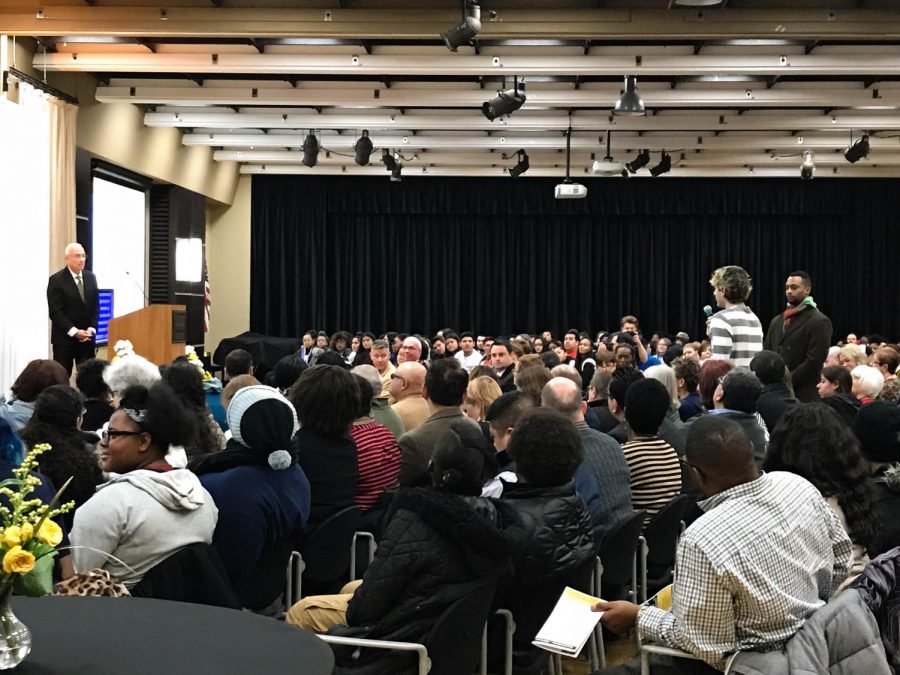District Judge speaks at MLK Day celebration
U.S. District Judge Gonzalo Curiel takes a question from a member of the audience during his appearance on the Hammond campus on Jan. 16.
U.S. District Judge Gonzalo Curiel spoke of the legacy of Martin Luther King Jr. at the 23rd annual Martin Luther King Jr. Community Celebration at the Westville campus on Jan. 15 and the Hammond campus on Jan. 16. Curiel called on everyone to set aside their differences and celebrate the power of voting and the rule of law.
Curiel, an East Chicago native who practiced law in Dyer for seven years before moving to California in 1986, has overseen the U.S. District Court for the Southern District of California since October 2012.
Curiel said he felt humbled to address this event on the 50th anniversary of King’s last birthday before he was assassinated on April 4, 1968. He said King left a precious legacy.
“It is a legacy of moving us closer to the promise that all men are created equal,” Curiel said.
Curiel praised King’s commitment to the rule of law despite the many reasons King could have lost confidence in it. The U.S. Supreme Court had denied citizenship rights for black people in the 1857 case Dred Scott v. Sandford, and, after that, was overruled by the 14th Amendment after the Civil War — the court declared separate is equal in 1896’s Plessy v. Ferguson.
Despite these setbacks, King chose nonviolent means of achieving the right to vote, which had been effectively taken from black people through use of literacy tests and other means. The laws demeaning the dignity of black people could not be considered democratic when they could not vote, but King believed voting could restore justice, Curiel said.
“Dr. King knew what the authors of the Jim Crow laws knew,” Curiel said. “The vote is powerful. It is the great equalizer.”
This nonviolent strategy saw success following the 381- day Montgomery, Alabama, bus boycott, after which segregation of buses was eliminated.
Beyond confronting enormous odds, King’s legacy comes from persevering through the hardship and criticism he had to endure, Curiel said. King was criticized by other black leaders who wanted to accept their misfortunes or who despaired and embraced black nationalism instead. He was later arrested and put in solitary confinement in Birmingham, Alabama, in 1963.
The civil rights movement won much greater support after the public saw the Birmingham church bombing and the murders of Mississippi civil rights workers, Curiel said. Finally, the events in Selma, Alabama, in March 1965 led to support for King’s goal.
“Bloody Sunday proved to be the turning point in realizing the necessary support to pass the Voting Rights Act,” Curiel said.
Curiel said people should regard Election Day as Martin Luther King Jr. Day and that the best way to honor his memory is to use the right to vote.
“We must never forget the immense price paid for these protections,” Curiel said.
Curiel also spoke about his youth in East Chicago and how people in that community worked and played together regardless of race and ethnicity. Curiel looked up to his brother, who became a lawyer and convinced Curiel that he could, too. This example shows the importance of a person’s surroundings and influences, Curiel said.
“If my brother had been a gang banger, if he was up to no good, there is little likelihood that I would be standing here today,” Curiel said.
Curiel received national attention in June 2016 when then-presidential candidate Donald Trump, disparaged Mexicans immigrating to the United States without authorization. Trump said Curiel was unfit to hear a lawsuit about Trump University because of his Mexican heritage.
After Curiel’s presentation, Steve Sersic, president-elect of the Lake County Bar Association, and Shelice Tolbert, former president of the association, presented Curiel with a plaque inscribed with a June 10, 2016, resolution condemning Trump’s comments against Curiel.
Curiel did not address the controversy with Trump and said before a Q&A session that he cannot comment on his cases.
Faye Moore, secretary of the LaPorte County NAACP chapter, said she hopes this community celebration continues.
“It really brings the community together,” Moore said. “It is really important that we remember the struggle of Martin Luther King.”


